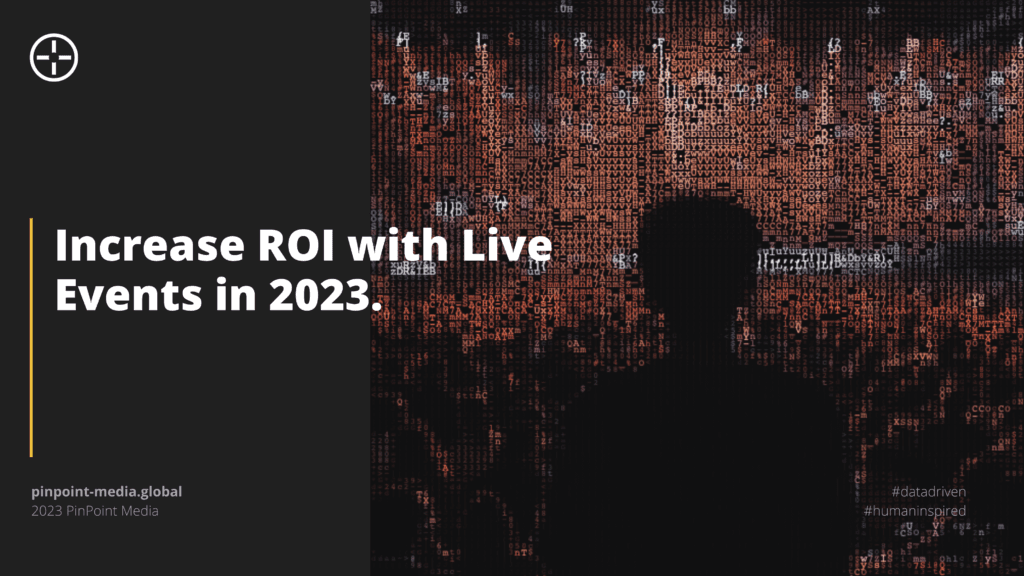Live events have always been a popular way for brands to engage with their audience, but with the rising costs of production and the uncertainty surrounding the return on investment, some brands may wonder whether live events are worth the investment. In this blog post, we’ll explore why live events are still valuable for brands, highlight some successful examples, and discuss how the event industry has changed post-pandemic and how technology can help provide traceability to ROI. We’ll also dive deeper into corporate events such as awards, conferences, and incentives.
Why Live Events are Valuable
Live events provide a unique opportunity for brands to connect with their audience on a personal level. Unlike online advertising or social media marketing, live events allow for face-to-face interaction and a more memorable experience. According to a study conducted by Event Marketing Institute, 74% of event attendees say that they have a more positive opinion about a company or brand after attending an event. Additionally, live events can provide valuable content that can be repurposed for online marketing efforts and social media campaigns.
Successful Examples
Many brands have successfully utilised live events to promote their products and services. For example,
Coachella music festival has become a cultural phenomenon and a coveted event for music fans around the world. The festival’s success can be attributed to its curated lineup, picturesque location, and experiential activations.
Nike’s “Just Do It” campaign, which featured a pop-up experience in Los Angeles. The event included a basketball court, a workout area, and a merchandise store, and it generated over 1 billion impressions on social media.
Corporate Awards
Corporate awards are a popular type of live event that recognizes and celebrates the achievements of employees or industry leaders. These events can help boost employee morale and motivation, and also provide a platform for companies to showcase their successes and network with individuals they might not otherwise have access to.
The National Cyber Awards is an excellent example of a successful awards event. This conference recognises and rewards the outstanding contributions of both public and private sector individuals and teams in the Cyber Security industry. The event has been successful in bringing together industry leaders and promoting excellence in the field for coming up to 5 years. It now has representation from Government to MoD to leading Cyber businesses such as BAE and Fortinet, and the awards provides an opportunity for leaders in these organisations to meet one another and work together to create a safer future.
Conferences
Conferences are another popular type of live event that allows industry professionals to come together and share knowledge and best practices. Conferences provide an opportunity for attendees to network, learn from keynote speakers and panel discussions, and gain insights into industry trends. The World Economic Forum in Davos, Switzerland is a prime example of a successful conference. The event attracts world leaders, business executives, and industry experts to discuss global issues and share ideas. The conference has become a platform for shaping policies and strategies on a global scale.
CIISE Live, featured on MSN’s & TechRadar Pro top tech conferences guide 2023, is also a good example of a growing conference which brings together top Cyber professionals from the public and private sectors. This has proven to be a hugely successful way for CIISEC to bring together its members and external stakeholders, with 100% of attendees saying they would recommend it to a colleague. It provides a milestone event for the organisation each year to keep its members engaged and provide industry-leading thought leadership.
Incentive Programmes
Incentive programs are another type of live event that can be used to motivate and reward employees or partners for their achievements. These events can range from team-building activities to luxury trips or experiences. Incentive programs can help improve employee retention, morale, and productivity. For example, Salesforce’s annual incentive program, “President’s Club,” rewards top-performing sales reps with a luxury trip to a destination of their choice. This program not only motivates employees to reach their targets but also fosters a sense of camaraderie and recognition among colleagues.
Data on Live Events and their Success
According to a study conducted by Bizzabo, an event management platform, 80% of marketers believe that live events are critical to their company’s success. Additionally, 85% of marketers say that they believe in-person events are essential to their company’s success. Another study by Harvard Business Review found that companies that invest in experiential marketing achieve higher customer satisfaction rates and greater customer loyalty.
Post-Pandemic Event Industry Changes
The event industry was heavily impacted by the COVID-19 pandemic, and many events were forced to cancel or move online. However, with the roll-out of vaccines and the easing of restrictions, live events are quickly returning. Post-pandemic, there have been huge changes in the event industry, including the use of hybrid events and the adoption of digital technologies.
Hybrid events are events that combine in-person and virtual elements, allowing for greater flexibility and reach. This type of event allows for attendees who cannot physically attend the event to participate virtually, providing a wider audience for the event. Additionally, hybrid events can provide cost savings and environmental benefits.
If you’re interested in reading more about live events post-pandemic then read this Forbes news article: https://www.forbes.com/sites/dbloom/2022/05/26/live-events-bounce-back-from-pandemic-and-forward-into-the-immersive-future/
or if you enjoy visual entertainment, have a look at this Ted Talk: ‘How can we go back to live events together’
https://www.youtube.com/watch?v=INYeFiNKT5I
Events and their Technology
Technology has revolutionised the event industry, and new tools and platforms are emerging all the time. Here are some examples of event technologies that are being used to enhance live events:
Virtual and augmented reality: These technologies are being used to create immersive experiences for attendees, from virtual tours of event spaces to augmented reality games and product demos.
Live streaming: Live streaming allows for real-time access to events for those who cannot attend in person. This technology has been particularly useful during the pandemic, as it has enabled events to continue even when attendees cannot be physically present.
Event apps: Mobile apps can be used to provide attendees with information about the event, including schedules, maps, and speaker bios. PinPoint Media’s event app also incorporates networking tools to help attendees connect with one another, allow sponsors to data capture and advertise to the audience, and provide interactive session tools.
Wearables: Wearable technology can be used to track attendee movements and provide personalised experiences. For example, RFID bracelets can be used to allow attendees to enter certain areas or receive personalised recommendations based on their interests.
Audience engagement tools: Tools like live polling and interactive displays can be used to engage attendees and gather feedback. These tools can help make events more interactive and engaging, and provide valuable insights for event organisers.
Digital signage: Digital signage can be used to display event schedules, branding, and promotional content. These displays can be updated in real-time and can help attendees navigate the event and stay informed.
Event management software: Event management software can be used to streamline event planning and execution, including ticketing, registration, and attendee management. These tools can help event organisers save time and reduce administrative overhead.
These are just a few examples of the many event technologies that are available to event organisers. By incorporating the right technologies into their events, brands can create more engaging and memorable experiences for attendees, and achieve their marketing goals more effectively.
Impact of Social Media on live events
Social media has also had a significant impact on the event industry, allowing brands to connect with their audience before, during, and after events. Platforms like TikTok and Instagram have introduced new ways for brands to engage with their audiences, such as TikTok Live and Instagram Live. These features allow for real-time interaction and can help extend the reach of live events beyond the physical attendees. For example, the #Coachella hashtag has been used over 10 million times on Instagram, and TikTok has become a popular platform for sharing festival experiences.
Top Tips for Running Successful Events
If you’re planning a live event for your brand, here are some top tips to help you ensure success:
Define your goals and objectives: Clearly define what you want to achieve with your event and ensure that all elements of the event are aligned with those goals.
Know your audience: Understand who your target audience is and what they expect from the event.
Create a memorable experience: Consider how you can create a unique and memorable experience for attendees that aligns with your brand’s values and messaging. Make sure to focus on the content of your event so that attendees feel like they gained a lot and it was time well spent.
Promote your event: Use a multi-channel approach to promote your event, including social media, email marketing, and targeted advertising.
Measure success: Define key performance indicators (KPIs) and track them throughout the event to measure success and identify areas for improvement.
Partners: Make sure to use experienced organising partners and suppliers who can support with venue sourcing, planning & execution of your event, alongside activation of the latest technologies to give attendees the best possible experience.
The Smart Label Revolution: Harnessing the Power of Digital Packaging.
We believe in live events so much we are running our own, partnered up with Huboo and Zappar. This event will discuss how connected packaging, mixed with creative Augmented Reality (AR) solutions can make your brand stand out. The event is free and includes cocktails from Mixtons. Live panel discussions, hands-on demos and networking!
To find out more information about the event, click here: https://www.eventbrite.co.uk/e/the-smart-label-revolution-harnessing-the-power-of-digital-packaging-tickets-620195039057 In addition, you can watch our exciting event sizzle reel at the following link: https://vimeo.com/manage/videos/827537125
In conclusion, live events continue to be a valuable tool for brands to connect with their audience and achieve their marketing goals. Whether it’s a corporate awards ceremony, a conference, or an incentive program, live events can provide a unique and memorable experience for attendees. We can expect to see continued innovation and the adoption of new technologies to provide safe and engaging events for audiences. By following best practices and staying abreast of industry trends, brands can successfully navigate the world of live events and achieve their marketing goals.
If you’ve enjoyed this blog, you may enjoy some of our other insights such as ‘Accelarating Your Brand Through TikTok Shopping’ or ‘The Rise of Ai and the perceived challenge of Creativity’ which you can view here: https://pinpoint-media.global/insights/
Stay Informed with PinPoint Media Blog




